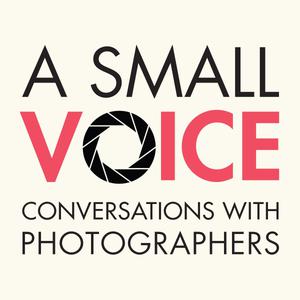
A Small Voice: Conversations With Photographers
Ben Smith
Fortnightly in-depth interviews featuring a diverse range of talented, innovative, world-class photographers from established, award-winning and internationally exhibited stars to young and emerging talents discussing their lives, work and process with fellow photographer, Ben Smith. Music: © John Moody.
- 1 hour 11 minutes248 - Ian Howorth
Ian Howorth is a documentary photographer based in Brighton, UK. His work deals with themes of identity and culture. Through Setanta Books, Ian sold out his first book, Arcadia, in 2019 and published his second, A Country Kind of Silence, in 2023. Ian’s work has been featured in publications including The Guardian, The New York Times, It’s Nice That and Huck.
In episode 248, Ian discusses, among other things:- Striving to spend as much time as possible not compromising
- The benefits of having a full-time job
- His Instagram strategy
- His previous life as a videographer
- An early fascination for film stock
- Influence of cinema
- The contrast between his trips to Peru and Cuba
- His first book Arcadia
- His origin story in which he lived in 9 homes across 3 countries
- His adventurous dad’s influence on him (and his brothers)
- Having to adapt to a move from Peru to Miami at 12
- His relationship with England and the things he is drawn to photograph there
- Combining documentary with fiction and not wanting to feel constricted
- His second book A A Country Kind of Silence
Referenced:
- Zed Nelson
- Phil Toledano
- Robbie Lawrence
- Max Miechoswski
- Stephen Shore
- William Eggleston
- John Divola
- Gregory Crewdson
- Sean Tucker
- Willam Verbeeck
- National Film & Television School
- Paris Texas
- Tania Franco Klein
- Bill Callaghan
“Wim Wenders and Robby Müller [In Paris Texas] happened to hit on something that made sense artistically but also looks beautiful aesthetically, and that for me is the perfect marriage. Not everyone can achieve it, but that to me became very important. I wasn’t doing that. I wasn’t smart enough to do that. But at the same time I knew the power of colour - I knew what it did, I understood my emotional response to it. And that was enough for me to pursue it at the time, and I would figure it out later.”
- Become a full tier 1 member here to access exclusive additional subscriber-only content and the full archive of previous episodes for £5 per month.
- For the tier 2 archive-only membership, to access the full library of past episodes for £3 per month, go here.
- Subscribe to my weekly newsletter here for everything A Small Voice related and much more besides.
- Follow me on Instagram here.
- Build Yourself a Squarespace Website video course here.
15 January 2025, 8:52 am - 1 hour 18 minutes247 - Ed Sykes
Ed Sykes is a photographer and visual artist based in London.
Ed’s practice focuses on landscape and changes to the environment as a result of natural processes and human activity. This approach is in conjunction with a re-working of photographic materials and a disruption of traditional photographic production. The processes and effects of climate change are often replicated during the image making process itself. The series 1000 Degrees used a blow torch to melt photographic negatives at a heat similar to the furnaces that propelled the Industrial Revolution. The work Hanging By A Thread pushed this same notion to the picture frames which were sourced secondhand and then the wooden surrounds were charred in a similar way to the subject matter of wildfires. Other approaches have involved sanding and abrasion echoing the effects of coastal erosion and also the use of soluble paper, the dissolution of an image in water, mimicking flood damage.
Ed was the recipient of an Arts Council grant for the project Eco Matters and Sustainable Processes. This saw Ed travel along Britain’s east coast and to some of Europe’s fastest eroding coastlines, embedding a new creative approach to climate change, environment and the anthropocene. In 2021 he was nominated for Prix Pictet Award with1000 Degrees, a response to the historical, industrial exploitation of natural resources in UK.
In episode 247, Ed discusses, among other things:
- Early days on The Independent
- Going to Somalia for ‘Operation Restore Hope’ and being disillusioned by it
- Moving towards portraiture for magazines…
- …and fashion
- Having to take a day job and the feelings that brings up
- Resetting, getting a 4x5 and doing it ‘without compromise’.
- Environmental themes and concerns
- Darkroom practice
- His Arts Council grant to pursue the project Eco Matters and Sustainable Processes
- Using plant-based developer and Agfa Record Rapid paper for the project Rock
- Accepting and embracing mistakes as part of the creative process
Referenced:
- Brian Harris
- Kalpesh Lathigra
- James Nachtwhey
- Paul Lowe
- Chris Steele Perkins
- Delilah Sykes
- Rodrigo Arantia
“As a photographer, you want something that drives you on. You need to find something that is close to your heart. And if you have that, you’re gonna go the distance. You’re gonna persevere, you’re gonna get up at four in the morning with the slim chance of getting one picture, because it’s important to you.”
- Become a full tier 1 member here to access exclusive additional subscriber-only content and the full archive of previous episodes for £5 per month.
- For the tier 2 archive-only membership, to access the full library of past episodes for £3 per month, go here.
- Subscribe to my weekly newsletter here for everything A Small Voice related and much more besides.
- Follow me on Instagram here.
- Build Yourself a Squarespace Website video course here.
1 January 2025, 9:48 am - 1 hour 21 minutes246 - The Year In Review 2024
Featuring:
- Richard Kalvar
- Natalie Keyssar
- Lorenzo Castore
- Edward Burtynsky
- Mitch Epstein
- Nicole Tung
- Linda Troeller
- Valerie Belin
- Michael Ackerman
- Julia Kochetova
- Chloé Jafé
- Debi Cornwall
- Louis Quail
- Abdul Kircher
- Diana Matar
- Kiana Hayeri
- Robbie Lawrence
- Agnieszka Sosnowska
- Polly Braden
- Stephan Vanfleteren
- Become a full tier 1 member here to access exclusive additional subscriber-only content and the full archive of previous episodes for £5 per month.
- For the tier 2 archive-only membership, to access the full library of past episodes for £3 per month, go here.
- Subscribe to my weekly newsletter here for everything A Small Voice related and much more besides.
- Follow me on Instagram here.
- Build Yourself a Squarespace Website video course here.
18 December 2024, 7:38 am - 1 hour 27 minutes245 - Paris Photo Fair 2024 Special
Featuring:
- Bieke Depoorter
- Jesse Lenz
- Lucas Foglia
- Sergio Purtell
- Richard Sharum
- Mark McLennan
- Alex Webb
- Rebecca-Norris Webb
- Michal Iwanowski
- Dragana Jurisic
- Lisa Barlow
- Toma Gerzha
- Gregory Halpern
- Mark Steinmetz
- Maxime Riché
- Become a full tier 1 member here to access exclusive additional subscriber-only content and the full archive of previous episodes for £5 per month.
- For the tier 2 archive-only membership, to access the full library of past episodes for £3 per month, go here.
- Subscribe to my weekly newsletter here for everything A Small Voice related and much more besides.
- Follow me on Instagram here.
- Build Yourself a Squarespace Website video course here.
4 December 2024, 8:11 am - 1 hour 17 minutes244 - Stephan Vanfleteren
Stephan Vanfleteren's career began as a staff photographer for the Belgian newspaper De Morgen. He continued to contribute to its weekend magazine as a freelancer until 2009.
His radical black and white social documentary work covers the disappearing phenomena of everyday life in his homeland, Belgium. Over the years, Stephan has worked in conflict zones such as Kosovo, Rwanda and Afghanistan and he is a six time winner of the prestigious World Press Photo awards among a number of other international prizes.
Stephan's intense portrait photography captures the essence of humanity in subjects ranging from the ordinary man to top politicians, sports idols and celebrities.
He has exhibited in Brussels, Amsterdam, Berlin, Paris, London, Liverpool and Verona and his books include: Elvis & Presley (Kruse Verlag, 2001) a road trip across America dressed as Elvis Presley with photographer Robert Huber; Flandrien (Mertz, 2005) on the Flemish obsession with cycling; Belgicum (Lannoo 2007) an enigmatic portrayal of Belgium and Portret 1989-2009 (Lannoo 2009). His most recent books are Atelier published by Hannibal Books, an ode to the ability to observe, represent, elevate, and ultimately, connect, and Present, a journey through his oeuvre, with expansive personal reflections and stories from three decades of encounters and photography, from street photography in world cities like New York to the genocide of Rwanda, from storefront façades to the mystical landscapes of the Atlantic wall, from still lifes to intense portraits, and Charleroi – Il est clair que le gris est noir.
In episode 244, Stephan discusses, among other things:- Memory
- Photographing (older) men
- Skin… and light
- Cutting his teeth in the newspaper world
- Flandrien book
- Rwanda
- Being scared of success
- Still getting nervous
- Atlantic Wall
- The intensity of collaboration with a subject
- Being perceived as a ‘traitor’ for shooting colour
- His project with Robert Huber, Elvis and Presley
- Dead animals
- Photographing his dad post mortem
- Moving to digital from film
- Charloi residency and his book Charleroi – Il est clair que le gris est noir
Referenced:
“I was very scared of success. That was maybe my luck. Success was something I had difficulty dealing with. People are complimenting you on your work at the beginning and I’m just accepting that but it was difficult. And it helped me because I never arrived. I was on my way and the doubts were still there. If you think you know how to do it, it’s time to leave. Sometimes if I think ‘ok, I can do that pretty well, Of course other people can do it better, but it’s time to change, to have another approach…’ So I had that in the early beginning, that feeling that I have to change. I love to begin something new.”
- Become a full tier 1 member here to access exclusive additional subscriber-only content and the full archive of previous episodes for £5 per month.
- For the tier 2 archive-only membership, to access the full library of past episodes for £3 per month, go here.
- Subscribe to my weekly newsletter here for everything A Small Voice related and much more besides.
- Follow me on Instagram here.
- Build Yourself a Squarespace Website video course here.
20 November 2024, 8:41 am - 1 hour 10 minutes243 - Unseen Festival 2024 Special
Featuring:
- Javier Hirschfeld Moreno
- Francesco Zizola
- Melissa Schriek
- Chilli Power
- Self Publishers United
- Bryan Schutmaat
- Tiffany Jones
- Atong Atem
- Become a full tier 1 member here to access exclusive additional subscriber-only content and the full archive of previous episodes for £5 per month.
- For the tier 2 archive-only membership, to access the full library of past episodes for £3 per month, go here.
- Subscribe to my weekly newsletter here for everything A Small Voice related and much more besides.
- Follow me on Instagram here.
- Build Yourself a Squarespace Website video course here.
6 November 2024, 9:25 am - 1 hour 16 minutes242 - Polly Braden
Polly Braden is a documentary photographer whose work features an ongoing conversation between the people she photographs and the environment in which they find themselves. Highlighting the small, often unconscious gestures of her subjects, Polly particularly enjoys long-term, in depth collaborations that in turn lends her photographs a unique, quiet intimacy. She works on long-term, self-initiated projects, as well as commissions for international publications.
Polly has produced a large body of work that includes not only solo exhibitions and magazine features, but a number of books published by Dewi Lewis, including Holding The Baby (2022), Out of the Shadows: The Untold Story of People with Autism or Learning Disabilities (2018), and China Between (2010), and two published by Hoxton Mini Press: London’s Square Mile: A Secret City (2019) and Adventures in the Lea Valley), (2016).
Polly teaches regularly at The University of Westminster and London College of Communication (LCC), she is a winner of the Jerwood Photography Prize, The Guardian Young Photographer of the Year, 2002, and the Joanna Drew Bursary 2013. Polly is nominated by Hundred Heroines 2020 and she has exhibited at numerous venues internationally. Her most recent solo exhibition, of her project Leaving Ukraine, just ended at the Foundling Museum in London, where it was on show from March 15th to October 20th 2024.
In episode 242, Polly discusses, among other things:
- Exhitibition at the Foundling Museum, Leaving Ukraine and how it came about
- Some of the people she focussed on
- Holding The Baby , her project on single parents
- Jena’s story
- Why she has started working with film projects
- Her introduction to photography
- Her first trip to China: “an exercise in isolation”
- Her project on Chinese factories and their workers
- Great Interactions book on people with learning disabilities
- Her current project she’s working on
- Securing funding, building partnerships and being an entrepreneur
Referenced:
- Patrick Sutherland
- Cheryl Newman
- Katz Pictures
- Becky Sexton
“I’m not someone who wanted to just jump in, point a camera at someone and walk away. I think I’ve always been someone who wanted it to feel very collaborative. Whether you’re on the street and you’ve made eye contact and you feel like someone’s ok with it, at the very basic level, to now as I get older, when I’d be as interested in someone doing all the work and me just being a vehicle through which someone can tell their story.”
- Become a full tier 1 member here to access exclusive additional subscriber-only content and the full archive of previous episodes for £5 per month.
- For the tier 2 archive-only membership, to access the full library of past episodes for £3 per month, go here.
- Subscribe to my weekly newsletter here for everything A Small Voice related and much more besides.
- Follow me on Instagram here.
- Build Yourself a Squarespace Website video course here.
23 October 2024, 7:28 am - 1 hour 20 minutes241 - Agnieszka Sosnowska
Agnieszka Sosnowska was born in Warsaw, Poland and was raised in Boston, Massachusetts. She earned a BFA from Massachusetts College of Art and a MFA from Boston University. She is currently an elementary school teacher. She lives on farm
in East Iceland. She is recognised for her self portraits that span 30 years. Currently she is working on series that embodies her life as an immigrant in Iceland. She uses the camera to take inspiration from a land that is otherworldly.“I grew up in Boston and traveled to Iceland 25 years ago on a whim”, says Agnieszka. “I fell in love and remained. With my Icelandic husband I chose to live in nature, not visit it. This decision has not been without tests. Together we have made a life that I feel we are only beginning. Everyday, I search for corners of quiet. When there, I stop and listen for a long time. These places exist around our farm, with friends, and the students I teach. These places are my everyday. They are my everything.”
Agnieszka has been the recipient of a number of grants, including a Fulbright Scholars Fellowship to Poland and an American Scandinavian Fellowship to Iceland. She was awarded the Hjálmar R. Bárðarson Photography Grant by the National Museum of Iceland. Her series was awarded the Director’s Choice by the Center awards in 2017 and she has been in the Top 50 of Critical Mass on three occasions. Her work has been exhibited in the National Museum of Iceland and the Reykjavik Museum of Photography. She is represented exclusively by Vision Neil Folberg Gallery in Jerusalem.
Earlier this year, Agnieszka released her debut photobook, För, published by Trespasser Books and already sold out.
Her collaboration with Icelandic poet Ingunn Snædal, entitled RASK, is currently being exhibited at the Reykjavik Museum of Photography until Decembet 2024.
In episode 241, Agnieszka discusses, among other things:
- Early years travelling to Communist Poland
- Wanting to assimilate into the USA as an immigrant
- Early education in photography at Mass. Art
- Her early interest in self-portraiture
- Not having a plan… but being a hard worker
- The trip to Iceland that changed her life…
- …and her decision to move there
- A description of where she lives
- The hardest thing to adapt to being the Winters
- The first things she started to photograph there
- Self-portaiture and the suckiness of documenting ageing
- The freedom of realising that you don’t have to work on distinct ‘projects’
- ‘Myth of a Woman’ - her attempt at exploring the experience of womanhood
- Collaborating with her students on portrait sessions
- The last picture in the book
- Her collaboration with Icelandic poet Ingunn Snædal, RASK, currently an exhibition at the Reykjavik Museum of Photography
Referenced:
- Cindy Sherman
- Margaret Johnson
- Laura McPhee
- Ingunn Snædal
- Barbara Bosworth
“I wanted to grow. I just didn’t know how. And I think the only way you grow is not by thinking about it but by doing it and making the mistakes. And I made a lot of mistakes. And thank God I did because in doing the mistakes I started to get more to having the self-portraits be more real. And that’s really hard to do. Especially I think as me having done it for so long, and also getting older in front of a camera, as a woman, it’s hard.”
- Become a full tier 1 member here to access exclusive additional subscriber-only content and the full archive of previous episodes for £5 per month.
- For the tier 2 archive-only membership, to access the full library of past episodes for £3 per month, go here.
- Subscribe to my weekly newsletter here for everything A Small Voice related and much more besides.
- Follow me on Instagram here.
- Build Yourself a Squarespace Website video course here.
9 October 2024, 7:53 am - 1 hour 19 minutes240 - Robbie Lawrence
Robbie Lawrence is a London based Scottish photographer and director represented by Webber Represents. Robbie is acutely attentive to the way images tell a story. Working with a painterly softness and sensitivity to his subjects, he deals in detail and nuance. From portraiture, travel and documentary to editorial work, he places the human experience front and centre to create thoughtful, abstract images, with an emphasis on narrative.
Recent books include Blackwater River and A Voice Above The Linn published by Stanley/Barker. Stills gallery in Edinburgh hosted the first UK institutional solo exhibition by Robbie in 2022, bringing together a snapshot of life post-Brexit across Scotland’s cities, rural locations and coastal towns.
Robbie’s new book, Long Walk Home, was just released (September 2024) by Stanley/Barker.
Clients Include: UN, Apple, Nike, Hermes, Gucci, The New Yorker, Du Monde, The New York Times Magazine, The Atlantic, I-D and many others.
In episode 240, Robbie discusses, among other things:
- His recent assignment at The Olympics
- His internship in Paris and his time in New York
- His relationship to painting and writing
- Building a career to encompass commercial and personal work
- How working commercially can be a ‘relief’.
- His ‘macrojournalistic approach’
- His first book project, Blackwater River
- His second book, A Voice Above The Linn
- Collaboration with poet John Burnside
- His new book about the Highland Games, Long Walk Home.
- Why he threw away three years worth of work and began again
- Working digitally with ‘manual’ lenses
- The difference between myth and history
- A reading from John Burnside’s essay in the book
Referenced:
- The Tokyo Olympiad, Kon Ichikawa
- The French, William Klein
- John Burnside
- Renton’s rant on why it’s ‘shite being Scottish’ from the movie Trainspotting
“I like the variety […] I like being on set. You become more like a director. As a photographer you’re almost the emotional heartbeat of a set. It’s interesting because at school and university I really found exams hellish from an expectation point of view. Like, I would put myself under a lot of pressure. And I would describe some of those more pressurised commercial jobs almost like a school exam where you expected to produce something of quality under a very tight time constraint. As a physical experience it can feel similar, and I suppose maybe it’s just experience that I can now recall moments where I’ve overcome those kind of stresses. So I like the shift.”
- Become a full tier 1 member here to access exclusive additional subscriber-only content and the full archive of previous episodes for £5 per month.
- For the tier 2 archive-only membership, to access the full library of past episodes for £3 per month, go here.
- Subscribe to my weekly newsletter here for everything A Small Voice related and much more besides.
- Follow me on Instagram here.
- Build Yourself a Squarespace Website video course here.
25 September 2024, 8:16 am - 1 hour 13 minutes239 - Kiana Hayeri
Visual storyteller Kiana Hayeri grew up in Tehran and moved to Toronto while she was still a teenager. Faced with the challenges of adapting to a new environment, she took up photography as a way of bridging the gap in language and culture. In 2014, a short month before NATO forces pulled out, Kiana moved to Kabul and stayed on for 8 years. Her work often explores complex topics such as migration, adolescence, identity and sexuality in conflict-ridden societies.
In 2014, Kiana was named as one of the emerging photographers by PDN 30 Under 30. In 2016, she was selected as the recipient of Chris Hondros Award as an emerging photographer. In 2017, she received a grant from European Journalism Center to do a series of reporting on gender equality out of Afghanistan and received Stern Grant in 2018 to continue her work on the state of mental health among afghan women. In 2020, Kiana received Tim Hetherington Visionary award for her proposed project to reveal the dangers of dilettante “hit & run” journalism. Later that year, she was named as the 6th recipient of the James Foley Award for Conflict Reporting. In 2021, Kiana received the prestigious Robert Capa Gold Medal for her photographic series Where Prison is Kind of a Freedom, documenting the lives of Afghan women in Herat Prison. In 2022, Kiana was part of The New York Times reporting team that won The Hal Boyle Award for The Collapse of Afghanistan and was shortlisted under International Reporting for the Pulitzer Prize. In the same year, she was also named as the winner of Leica Oskar Barnack Award for her portfolio, Promises Written On the Ice, Left In the Sun, an intimate look into the lives of Afghan from all walks of life.
Kiana, along with her colloaborator, the researcher Mélissa Cornet, is recipient of the 2024 Carmignac Photojournalism Award for the reportage No Woman’s Land, an investigation into the plight of women in Afghanistan under the Taliban and the work will be showcased in a double exhibition this Autumn - from October 25th to November 18th - at the Réfectoire des Cordeliers in Paris as part of the Photo Saint Germain festival.
Kiana is a Senior TED fellow, a National Geographic Explorer grantee and a regular contributor to The New York Times and National Geographic. She is currently based in Sarajevo, telling stories from Afghanistan, The Balkans and beyond.
In episode 239, Kiana discusses, among other things:
Her story for the NYT about FGM in Gambia
Gender apartheid
Her take on winning awards as a photojournalist
Having to Google what the Robert Cap Gold Medal was - having won it
Her book When Cages Fly
Moving to Canada from Iran as a teenager
How photography helped her bridge the ‘culture and language gap’.
Being at a ‘gifted’ school
Her first trip to Afghanistan
Comparisons with Iran in terms of relative ‘liberalism’.
Her first commission from National Geographic
Her story on women in Herat prison
The moment Afghanistan fell to the Taliban and her guilt over leaving friends behind
Gender apartheid in Afghanistan specifically
The dangers of ‘dilettante hit and run journalism’
Referenced:
“I tell people having a camera is like living a thousand different lives, but you have that camera as an excuse to immerse yourself into something, live it for a while and then walk away when you’re ready.”
- Become a full tier 1 member here to access exclusive additional subscriber-only content and the full archive of previous episodes for £5 per month.
- For the tier 2 archive-only membership, to access the full library of past episodes for £3 per month, go here.
- Subscribe to my weekly newsletter here for everything A Small Voice related and much more besides.
- Follow me on Instagram here.
- Build Yourself a Squarespace Website video course here.
11 September 2024, 7:47 am - 1 hour 6 minutes238 - Diana Matar
Using photography, testimony and archive, Diana Matar's in-depth bodies of work investigate themes of history, memory and state sponsored violence. Grounded in heavy research and often spending years on a project, Diana attempts to capture the invisible traces of human history and produces installations and books that query what role aesthetics might playin the depiction of power. A graduate of the Royal College of Art, Diana has received the Deutsche Bank Pyramid Award for Fine Art; the International Fund for Documentary Photography; a Ford Foundation Grant for artists making work on history and memory; and twice been awarded an Arts Council of England Individual Artist Grant. Her work is held in public and private collections and has been exhibited in numerous institutions including Tate Modern, London; The National Museum of Singapore; Museum Folkswang, Essen, Germany; The Institut du Monde Arabe, Paris; The Museum of Contemporary Photography, Chicago; and Musee de la Photographie a Charleroi. Her monograph Evidencewas published in 2014 by Schilt Publishing Amsterdam to critical acclaim and chosen by New York Times Photography critic Teju Cole as one of two best photography books of the year. In 2019 Matar was appointed Distinguished Artist at Barnard College Columbia University, New York. In April 2024 Diana’s most recent book, My America, was published by GOST Books.
In episode 238, Diana discusses, among other things:
- Early experiences in Panama and Latin America.
- How an errand to buy a lightbulb changed everything.
- A brush with Manuel Noriega.
- How she met her Libyan husband, the writer Hisham Matar.
- Why she found doing her M.A. ‘really, really challenging’.
- Her first book project, Evidence.
- The inclusion of her own writing in the book.
- Her latest book, My America.
- Some of the key factors around the issue of police shootings.
- The complexities of the subject.
- How she has “intermalised a European sense of America.”
- Why she shot the project on her iPhone and the rules she imposed on herself.
- Whether photographs can ‘bear the burden of history.’
- What she is currently working on.
- Her reaction to the bonus questions.
“I think I internalised a European sense of America in several different ways. When I was out on the road a lot of things seemed exotic to me, things that I’d grown up with and were just part of being: the long distances; these buildings that just pop up in the middle of nowhere; the emptiness; the scale… the kind of watching of movies of what is the American west. The internalisation I think has something to do with scale. I live in London - the small streets, you’re around people all the time, and then being in this openness, which i miss and i love, but I did find it unnerving and it effected how I made the work actually.”
- Become a full tier 1 member here to access exclusive additional subscriber-only content and the full archive of previous episodes for £5 per month.
- For the tier 2 archive-only membership, to access the full library of past episodes for £3 per month, go here.
- Subscribe to my weekly newsletter here for everything A Small Voice related and much more besides.
- Follow me on Instagram here.
- Build Yourself a Squarespace Website video course here.
28 August 2024, 8:00 am - More Episodes? Get the App
Your feedback is valuable to us. Should you encounter any bugs, glitches, lack of functionality or other problems, please email us on [email protected] or join Moon.FM Telegram Group where you can talk directly to the dev team who are happy to answer any queries.
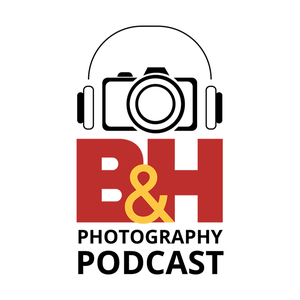 B&H Photography Podcast
B&H Photography Podcast
 The Candid Frame: Conversations on Photography
The Candid Frame: Conversations on Photography
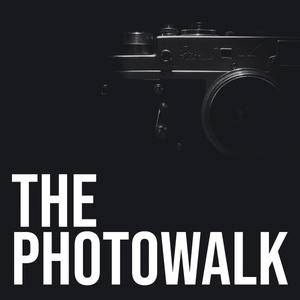 The Photowalk
The Photowalk
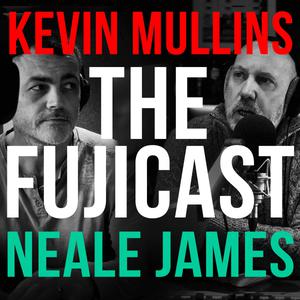 The FujiCast: Photography Podcast
The FujiCast: Photography Podcast
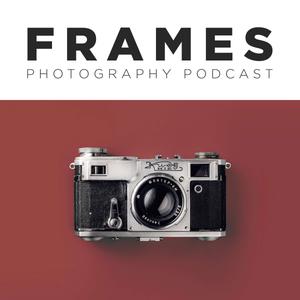 FRAMES Photography Podcast
FRAMES Photography Podcast
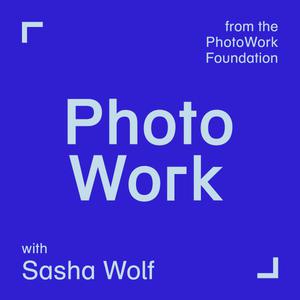 PhotoWork with Sasha Wolf
PhotoWork with Sasha Wolf